Customer support today needs to be fast, personalized, and available across multiple channels. The old-school, on-premise help desk tools weren’t built for that. They’re hard to scale and often siloed from the rest of your tech stack. Your business deserves better than that.
That’s where cloud-based help desk platforms come in.
These platforms solve common support pain points like slow ticket resolution and limited visibility into customer interactions. And they do it without expensive hardware or long IT rollouts, while improving customer satisfaction by up to 80%.
Whether you’re an ecommerce brand, a SaaS startup, or a growing B2B service provider, cloud-based help desks enable customer support automation across multiple channels.
Choose a powerful cloud-based help desk platform
What is a cloud-based help desk platform?
A cloud-based help desk platform is a software-as-a-service (SaaS) solution that allows support teams to manage customer requests across multiple channels. It does that using a centralized, browser-accessible interface.
Cloud-based help desk platforms handle ticketing, live chat, knowledge bases, automation, and reporting, all typically hosted on the vendor’s servers, not your own. This means that you don’t need to install anything locally. Your team just logs in, connects channels, and starts resolving customer issues.
It’s important to distinguish cloud-based help desks from CRMs and traditional ticketing systems:
- Help desk platforms focus on resolving customer issues with tools for communication, automation, and resolution tracking.
- CRMs manage customer data, sales pipelines, and long-term relationship building.
- Basic ticketing systems log and track issues but often lack automation or channel integrations.
The modern help desk is hybrid. It brings together the structure of ticketing with CRM-like customer context, but adds automation and multi-channel communication capabilities.
Read more: Discover the best help desk ticketing systems and decide which one you should consider for your business.
5 main benefits of using cloud-based help desk software
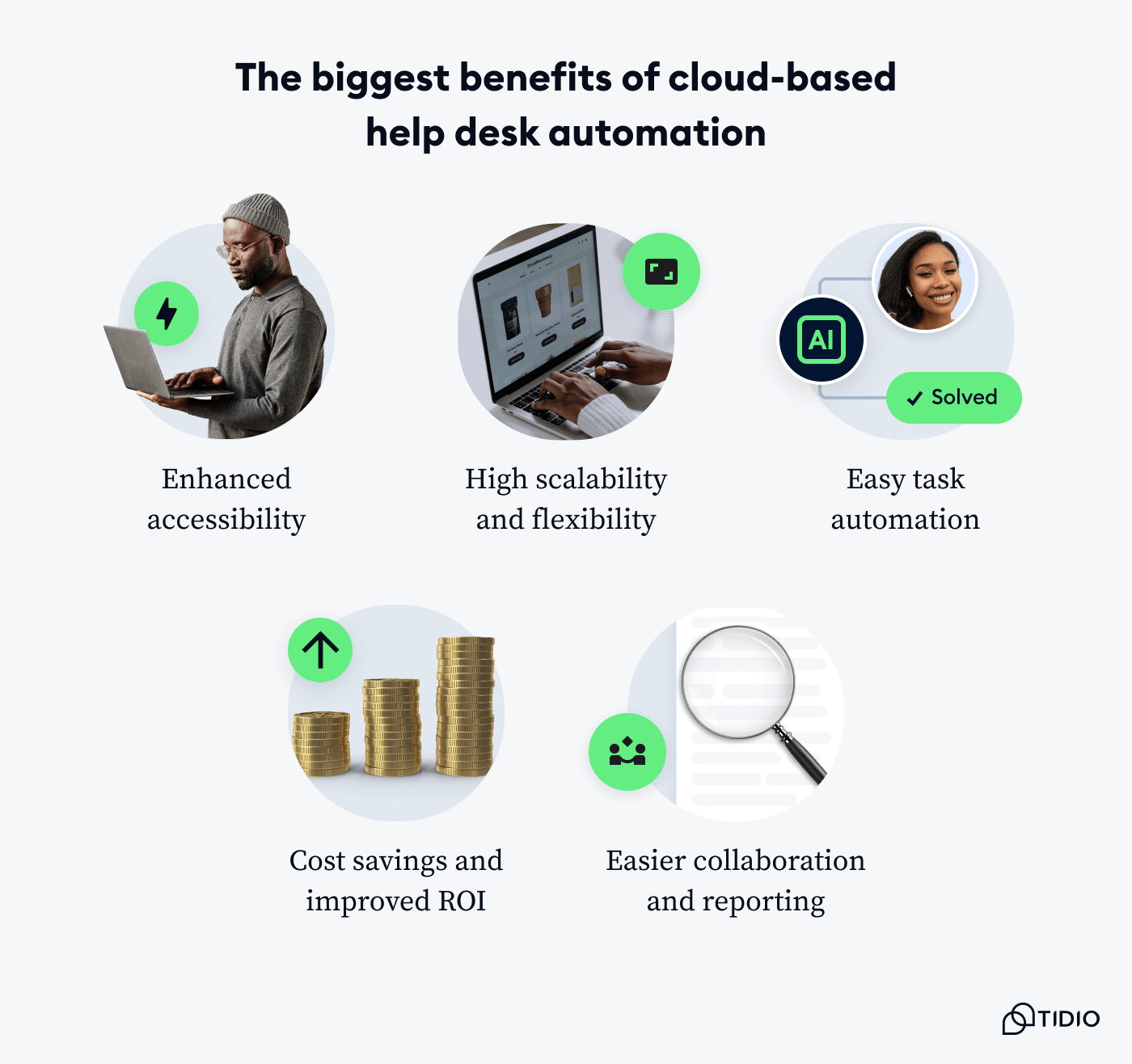
Over 70% of businesses report that implementing web-based help desk software adoption leads to improved customer satisfaction. Enterprise-level companies are leading the way with over 60% of large businesses now offering self-service portals or automated FAQs, highlighting the importance of user experience and operational efficiency.
The shift is already underway, and for good reason. Let’s have a more detailed look at the five key benefits:
1. Enhanced accessibility
With cloud-based systems, your support team can work from anywhere. Whether your agents are in the office, remote, or distributed across time zones, everyone is up to date on all the customer interactions. This accessibility is a must-have for 24/7 global support.
2. High scalability and flexibility
Cloud help desks grow with your business. You can start with three agents and scale to thirty (or three hundred) without migrating systems or buying extra servers. Adding new channels, like WhatsApp automation or live chat, takes minutes, not weeks. The best platforms also support role management and advanced features as your team expands.
3. Easy task automation
Manual ticket triaging, ticket routing, and repetitive replies slow down your processes. Cloud platforms let you automate these tasks using rule-based workflows, macros, and AI agents. An interesting Gartner study suggests that AI agents will autonomously resolve 80% of common customer service issues without human intervention by 2029.
Read more: Learn how Your KAYA managed to automate 75% of inquiries with Tidio’s AI.
4. Cost reduction

You pay for what you use. No server maintenance, no software update cycles, no physical IT overhead. Most vendors offer flexible monthly pricing that aligns with team size, ticket volume, or feature access.
Plus, updates are automatic, which means that new features roll out without disruption. Recent reports say that organizations using AI and automation in support cut operational costs by up to 30%.
5. Easier collaboration and reporting
Cloud-based help desks unify your team around a single shared inbox. Internal notes, collision detection, and shared views help avoid duplicated efforts.
Built-in dashboards show agent performance and ticket resolution times, as well as other useful KPIs like customer satisfaction scores, allowing you to make data-backed decisions fast.
Read more: Learn how to measure customer satisfaction to improve your support efforts and boost retention.
What key features to look for in a cloud-based help desk?
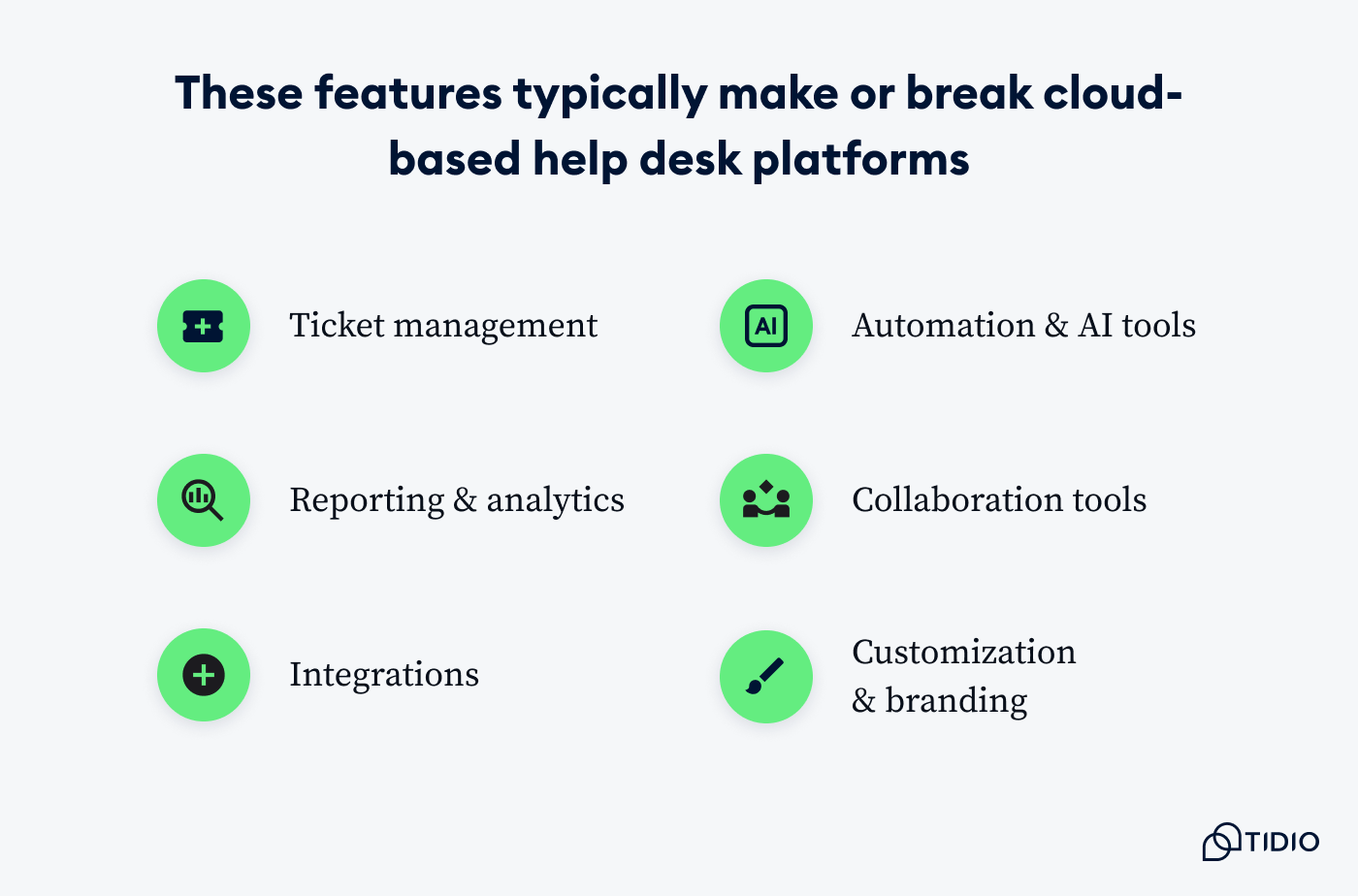
Features are what make or break cloud help desk software. Studies report that 66 % of support leaders prioritize IT asset management (ITAM) functionality when choosing a help desk tool, showing a preference for rich, specialized feature sets over simpler ticketing alone.
These are the droids… sorry… features you’re looking for when choosing a cloud-based help desk software:
Ticket management
A strong ticket management system is the backbone of any help desk. You need a unified inbox that brings together customer messages from all of your channels in one place.
Sure, convenience is paramount here, but it’s also about how you maintain speed and consistency. Look for platforms that allow automatic ticket assignment based on workload, tags, or issue type. SLA tracking and escalation rules should be built in so urgent cases get prioritized without manual intervention. Without these core systems, your agents are flying blind.
Automation & AI tools
Modern help desks should reduce repetitive work, not add to it. Automation features allow you to handle basic queries, tag tickets, and send out canned responses instantly.
But the real shift is happening with AI-powered tools.
AI agent assistants can surface the best responses, detect customer intent, and much more. Integrating AI tools, like Lyro, has led to an 87% reduction in average customer service resolution times, significantly enhancing operational efficiency. The right platform should make these tools accessible without a complex setup.
Did you know that…
Axioma, a UK-based company specializing in mobile car body repairs and insurance, used Tidio’s Lyro AI agent to boost customer experience. They achieved an impressive 89% AI resolution rate and increased sales bot engagement to 21%.
Choose Tidio as your cloud-based AI-powered help desk platform
Reporting & analytics
Peter Drucker, the inventor of modern business management, once said: “If you can measure it, you can improve it.” This is also true for customer service, which is why tracking proper help desk metrics is key.
Real-time dashboards give team leads visibility into what’s happening right now, while detailed reports help to track trends over time. Look for platforms that offer agent-level metrics like average handle time and ticket resolution rate, along with customer-facing scores like CSAT or NPS. These insights are important for performance reviews, but are also critical for spotting issues before they escalate and improving overall customer experience.
Collaboration tools
Support is rarely handled by one person alone. A good help desk platform should offer real-time collaboration between agents without slowing things down. Features like internal notes allow agents to pass context without involving the customer.
On top of that, collision detection helps avoid multiple people working on the same issue by mistake. And shared views or team inboxes make it easier to organize work based on channel, priority, or department. These tools help teams stay aligned even when fully remote.
Integrations
Your help desk shouldn’t operate in a silo—it should work seamlessly with the rest of your tech stack. Native integrations with platforms like Shopify and WooCommerce allow you to pull customer order data directly into support tickets and unlock the full potential of ecommerce chatbots. Slack integrations enable real-time alerts and internal updates, keeping your team in sync.
And by connecting your CRM, agents get instant access to customer details without switching tabs, helping you automate workflows across systems. Without these connections, agents spend more time chasing context than actually solving problems.
Did you know that…
Tidio is the best helpdesk ticketing system for ecommerce businesses because it connects easily with platforms like Shopify and WooCommerce. Your team can see customer orders and cart details right inside the chat, which helps with quicker, more personalized support and boosts sales.
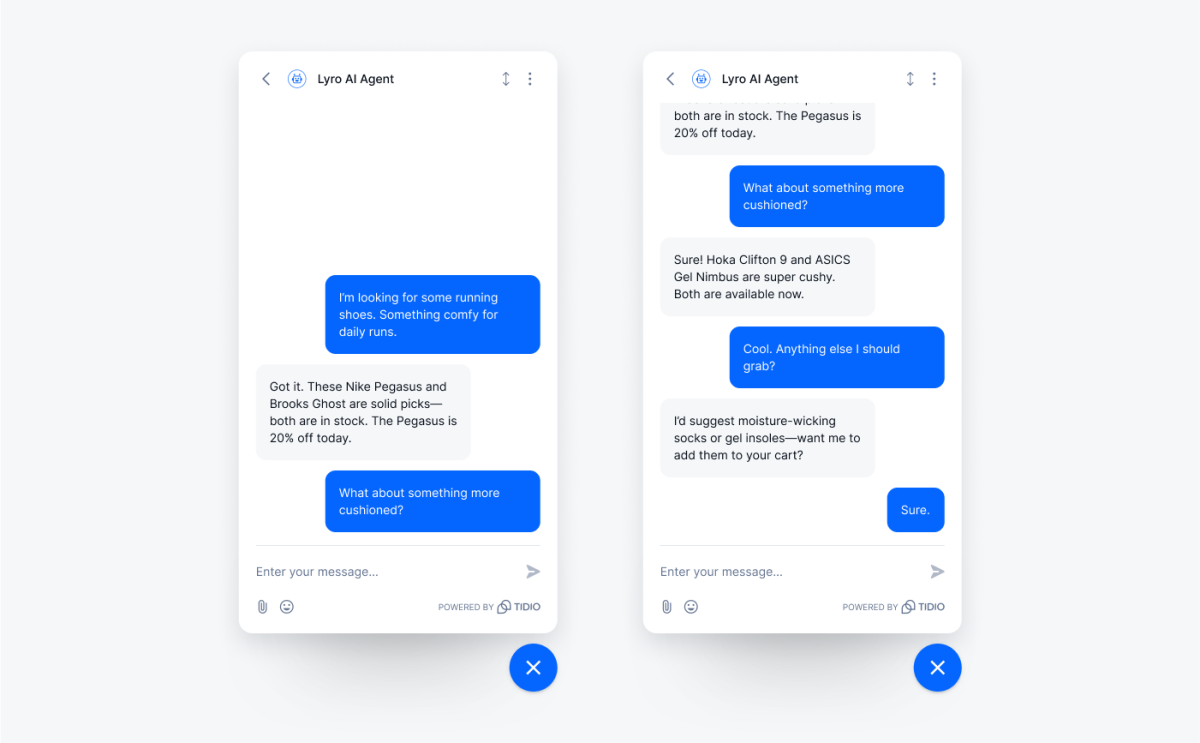
Read more: Discover the best ecommerce case studies to see how AI-powered customer service automation can help your business grow.
Customization & branding
Every company has its own brand voice and look. Your help desk should reflect that. Platforms with flexible customization let you style chat widgets, emails, and help centers to match your brand identity. White-labeled customer portals help maintain a seamless user experience.
Support for multiple languages and personalized messages is key if you’re serving international audiences. Not only do these details make things look nicer, but they also improve engagement with your customers.
5 critical factors to consider before choosing a help desk ticketing system
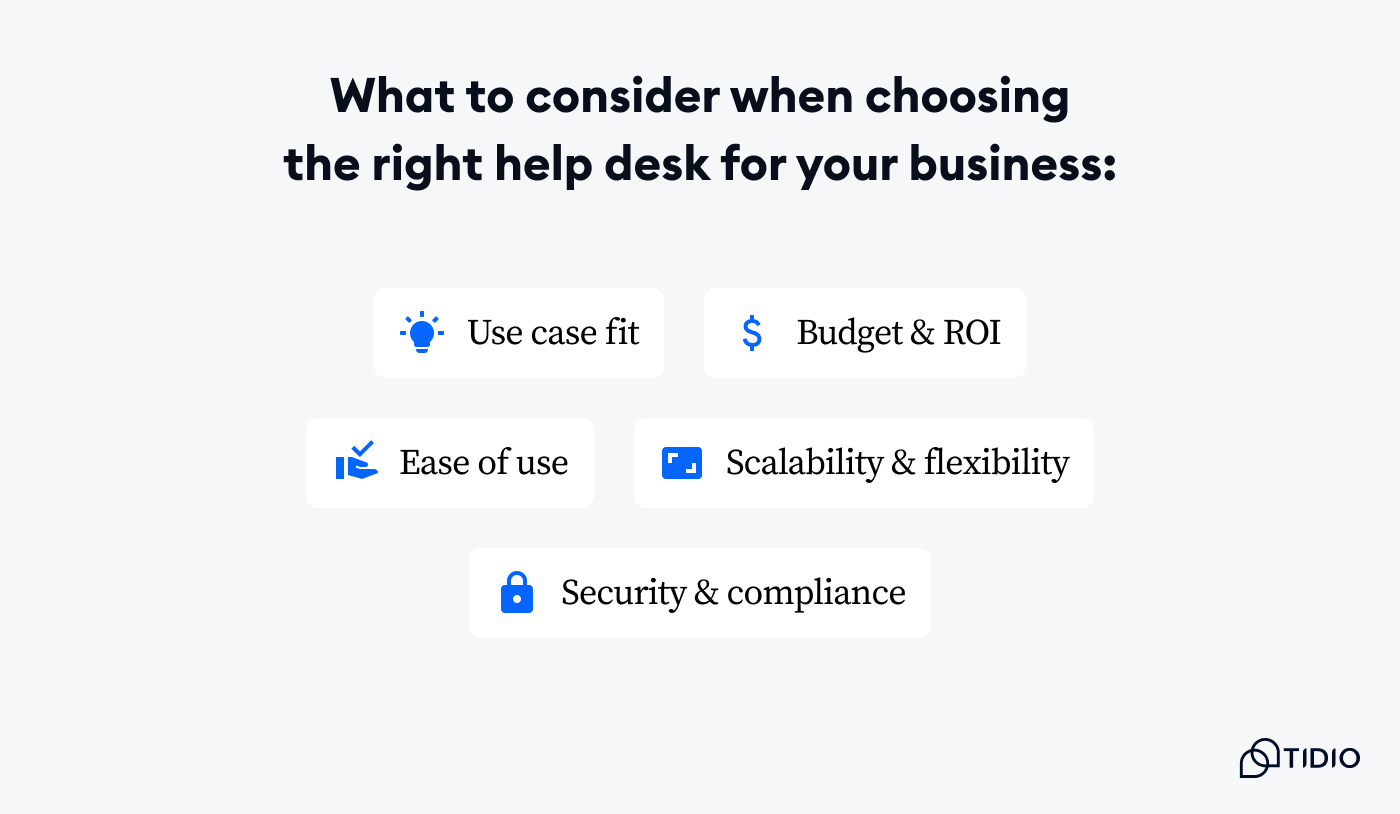
When looking for an IT ticketing system and cloud help desk platforms, AI features are a must.
In fact, 70% of CX leaders think generative AI makes every digital customer interaction more efficient. Choosing a cloud service desk without evaluating core factors is likely a costly mistake.
Let’s see what to consider while making your decision:
Use case fit
The best help desk platform for your team depends on your business model and the nature of your support requests.
An ecommerce store dealing with hundreds of real-time product queries needs fast chatbot automation, live chat, Shopify live chat, and other relevant integrations. A SaaS team may need deeper help desk workflow automation and user context pulled from their product. B2B service teams might prioritize email-based support with longer resolution cycles, or even B2B lead generation functionalities.
Volume, ticket complexity, and preferred channels should all influence which platform fits your operational reality, not just what looks good on a feature checklist.
Budget & ROI
Don’t just compare sticker prices. Factor in how the platform charges—whether it’s per agent, per ticket, or based on feature tiers. Check if there are onboarding or setup fees, and look closely at usage caps or limits on integrations.
Trial periods give you a good idea of short-term value, but think long term. Are you locked into annual contracts? Are there extra costs for AI features, automation, or custom branding? The real ROI comes from choosing a platform that can grow with your team without ballooning your monthly bill.
Did you know that…
Tidio offers scalable pricing for its services, enabling businesses of all sizes to find a pricing plan that brings the most value for the money invested. You can even use the Tidio ROI calculator, which lets you discover approximate cost savings and ROI boosts you can expect directly from using Tidio.
Ease of use
A cloud ticketing system should make your team’s work faster and should be implemented easily. Complex interfaces and convoluted implementations may lead to frustration.
If onboarding takes months or agents need special training to use basic functions, that’s a red flag. The interface should be intuitive enough for a new hire to get up and running within a day or two. Also, the admin side should allow non-technical managers to create rules, view reports, and update workflows without relying on IT.
Scalability & flexibility
Your support needs today won’t be the same a year from now. Choose a platform that doesn’t break under growth. Whether you’re adding new agents, launching a second brand, or expanding to new channels like WhatsApp or Instagram DMs, your help desk should scale with you.
This means flexible workflows, no hard caps on tickets or users, and the ability to support different teams and business units without requiring a complete system overhaul. A rigid platform may work now, but it will limit your growth later.
Read more: Find out which WhatsApp AI chatbot tools your business should consider.
Security & compliance
Make sure the platform meets compliance standards like GDPR, HIPAA, or SOC 2, and check if they offer encryption, role-based access, and detailed audit logs. You should be able to control who sees what and maintain full visibility over your team’s access. Without these controls, you’re putting both customer trust and legal compliance at risk.
Did you know that…
Tidio complies with GDPR and CCPA regulations regarding customer data privacy and security. It also adheres to anti-spam requirements and offers features for consent, deletion, and access control to support EU data protection laws. Additionally, Tidio is committed to safe and ethical AI practices aligned with global standards.
Top 5 best cloud-based help desk platforms to consider
There are hundreds of help desk tools out there, but many are packed with features most teams don’t need. This list focuses on platforms that offer smart automation, easy setup, and real support value from day one.
Each tool brings something different like AI agents, multichannel customer service, or streamlined ticketing that scales without the bloat.
| Name | Rating | Free plan? | Best for |
| Tidio | 4.7/5 ⭐️ | ✅ | AI agents and NLP chatbots |
| HubSpot Service Hub | 4.4/5 ⭐️ | ✅ | Ticket segmentation |
| Gorgias | 4.6/5 ⭐️ | Free trial | Ecommerce use cases |
| Zoho Desk | 4.6/5 ⭐️ | 15-day free trial | Multiple third-party integrations |
| Help Scout | 4.4/5 ⭐️ | Free trial available | Shared team inbox |
1. Tidio
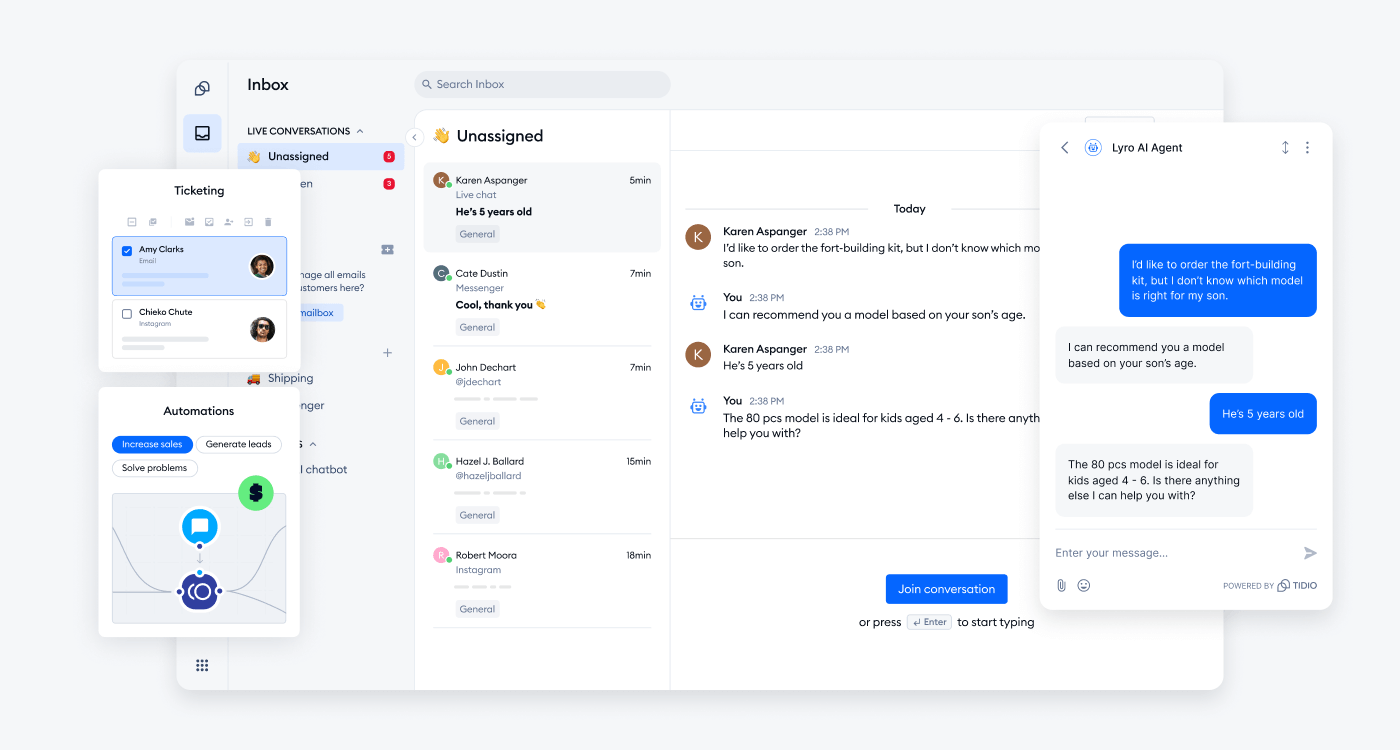
Tidio is a flexible help desk platform that combines live chat benefits, multichannel inboxes, and AI chatbot automation in one clean interface. Its AI agent, Lyro, can instantly resolve up to 70% of common customer questions, helping teams respond faster and stay available 24/7 without extra strain.
Easy to set up and use, Tidio integrates with Shopify, WordPress, and leading CRMs—making it a smart choice for ecommerce, SaaS, and service-based businesses.
Main features:
- AI agents and chatbots
- Multichannel support
- Help desk workflow automation
- Ticketing management
- Service level agreements (SLAs)
- Tidio canned responses
Pricing:
- 7-day free trial available
- Free version available
- Starter ($24.17/mo)
- Growth (starts at $49.17/mo)
- Plus (starts at $749/mo)
- Premium (starts at $2999/mo)
2. HubSpot Service Hub
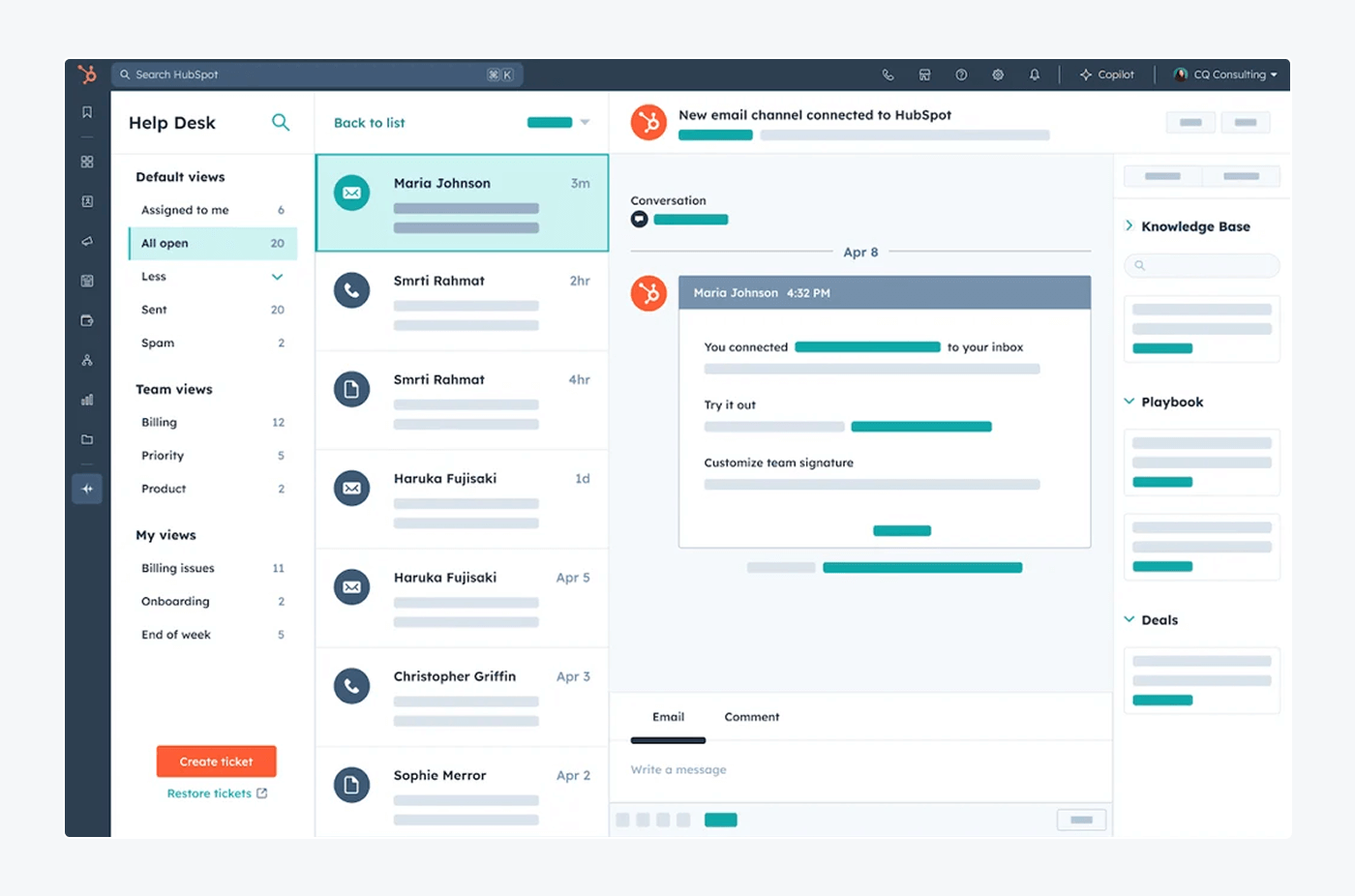
HubSpot’s help desk, part of the Service Hub, includes ticketing, customer feedback, and a knowledge base for self-service. Teams can organize tickets by region or brand using pipelines. It also helps manage support requests with features like automated routing, SLA tracking, and performance monitoring.
Main features:
- Ticketing system
- Knowledge base
- Live chat & conversational bots
- Customer feedback surveys
- Reporting & analytics
Pricing:
- Paid plans start at $15 per user/month, billed annually.
- A free plan is available.
Read more: Learn which HubSpot alternatives to look for in 2025.
3. Gorgias
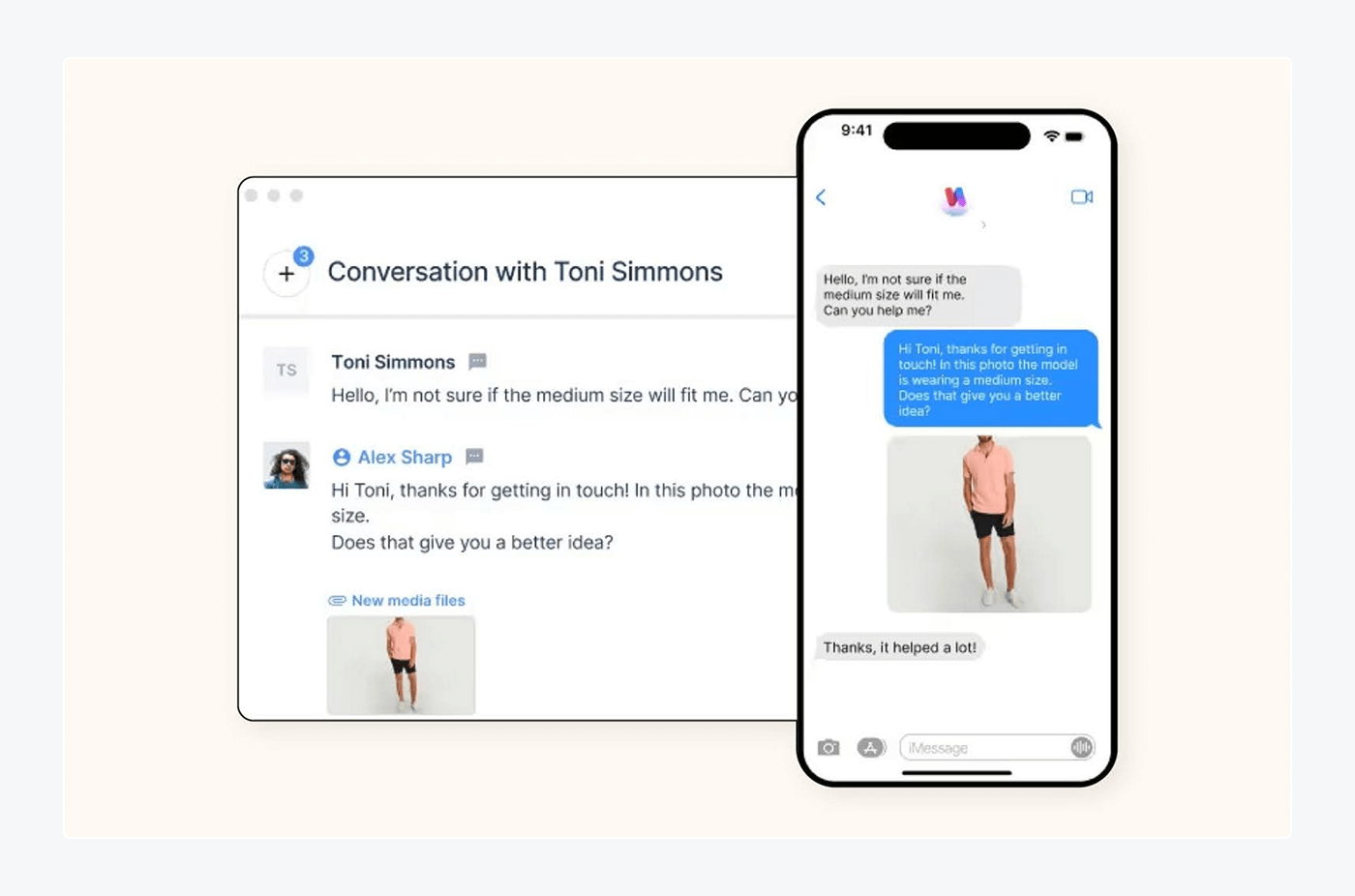
Gorgias offers service software built for ecommerce, integrating with platforms like Shopify so agents can manage orders, refunds, and customer accounts directly from the help desk. It supports multichannel communication and unifies customer data into a single profile, making it easier to track behavior and preferences.
Main features:
- Omnichannel support
- Automated responses
- Intent and sentiment detection
- Shopify integration
- Macros and rules automation
Pricing:
- Plans start at $10 per month for 10 support tickets.
- A free trial is available.
Read more: Discover the top 10 Gorgias alternatives and competitors for ecommerce.
4. Zoho Desk
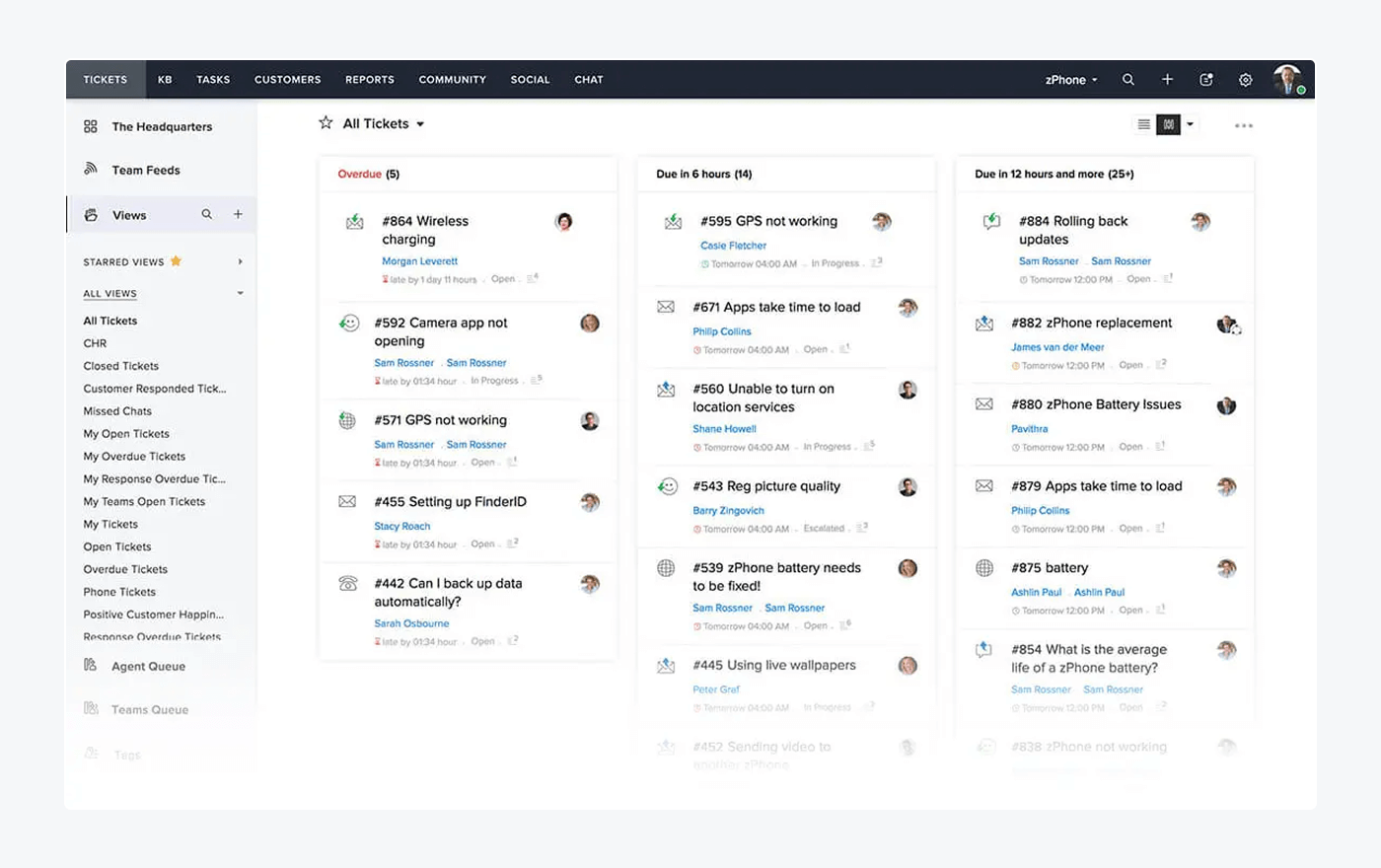
Zoho Desk is known for its simplicity and reliable customer support features. While its design is basic, it offers practical tools for a range of budgets, including an easy-to-use knowledge base for both staff and users. A standout feature is its strong reporting and analytics, with custom dashboards, ticket summaries, and built-in performance reports.
Main features:
- Ticket management
- Multi-channel support
- Automation & workflows
- AI-powered Zia assistant
- Customizable dashboards & reports
Pricing:
- Plans start at $7 per user/month, billed annually.
- A free plan and a 15-day free trial are available.
Read more: Learn why these 11 Zoho Desk alternatives and competitors are worth looking into.
5. Help Scout
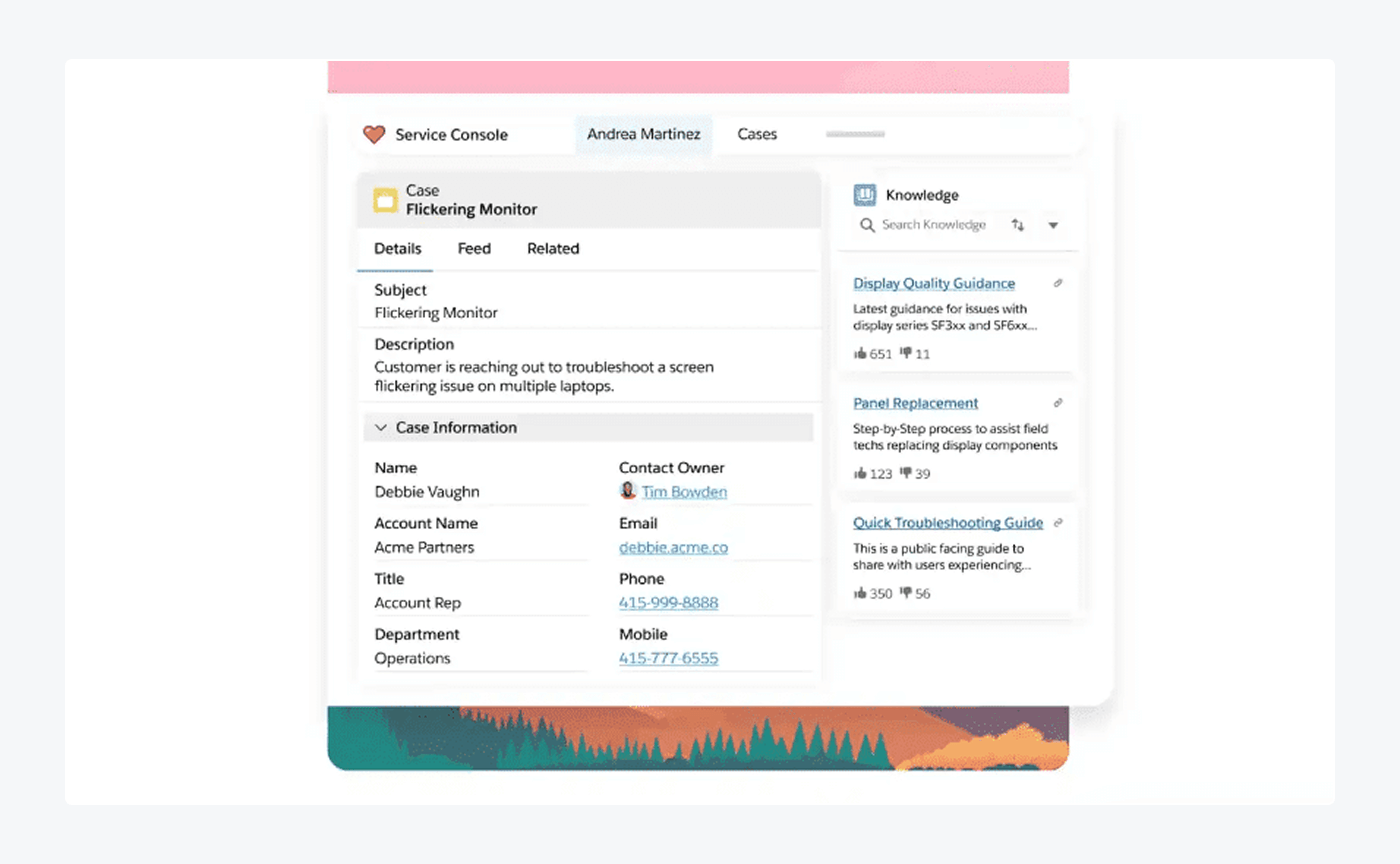
Help Scout is a collaborative help desk tool built for teams handling high volumes of support. It includes automated workflows, a full knowledge base, integrated docs, and an API—making it a strong fit for ecommerce.
Key features include a shared inbox that works across social channels, built-in live chat, and premium options like a self-service portal and chatbot integration. Teams can also create custom reports to track activity across multiple channels.
Main features:
- Shared inbox
- Knowledge base
- Live chat
- Customer management
- Reporting & analytics
Pricing:
- Paid plans start at $50 per month.
- A free plan and a free trial are available.
Read more: Check out best Help Scout alternatives that you might find better suit your needs.
Choose Tidio as your go-to AI-powered cloud-based help desk
Tidio stands out as a powerful, easy-to-deploy solution for businesses that want smart automation and real-time support without enterprise complexity. Its Lyro AI agent handles repetitive questions, routes tickets, and assists human agents with summaries and response suggestions.
This means faster resolutions and happier customers.
Tidio’s pricing plans are affordable, with full AI capabilities available even on lower tiers—unlike competitors that gatekeep key features. Implementation is fast. You can connect channels, build workflows, and launch AI-powered chat in a day. Its Shopify and WooCommerce integrations are native, and it also connects with Zapier, CRMs, and Slack out of the box.
Plus, the accuracy of Tidio’s AI agents is constantly improving, thanks to conversational data training and feedback loops. This makes them far more reliable than traditional chatbots.
If you’re looking for a scalable help desk that combines live support, automation, and AI in one place, Tidio is the platform to start with.
Choose Tidio as your cloud-based AI-powered help desk platform

